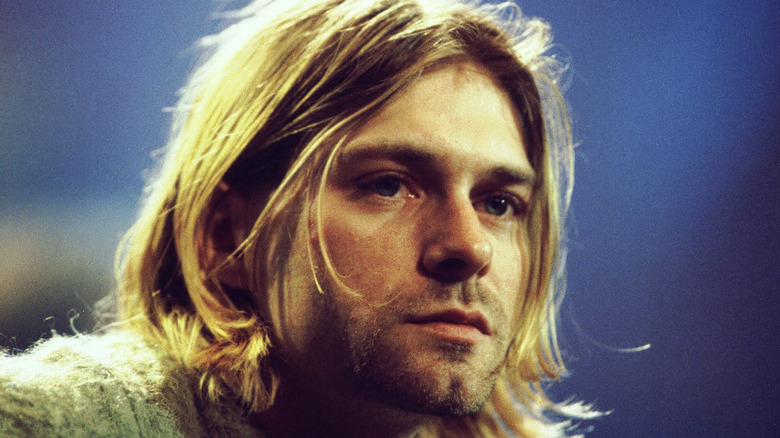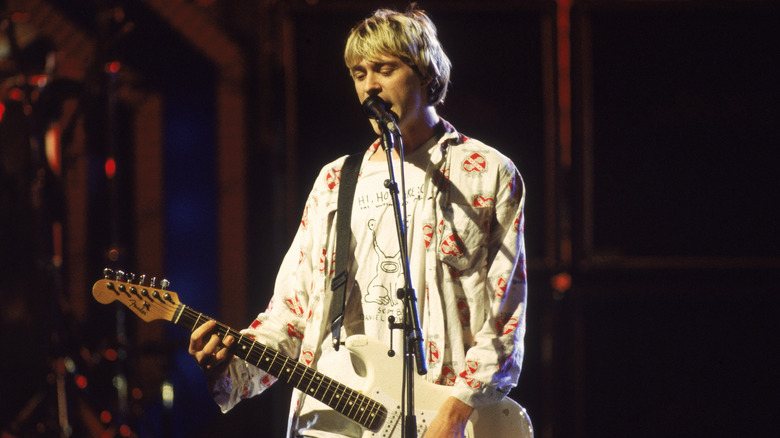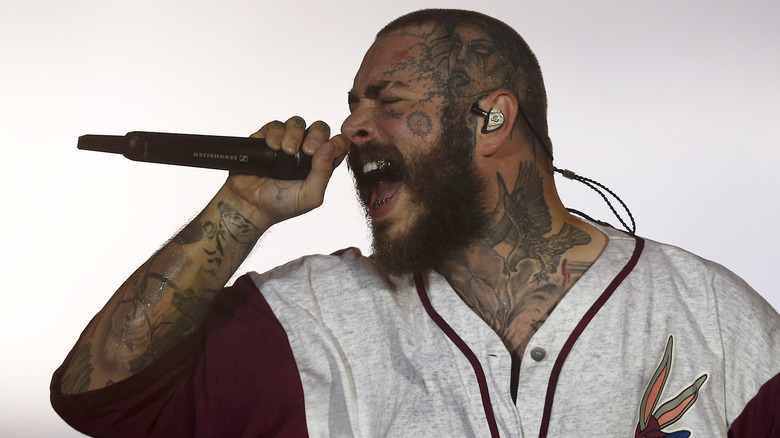Kurt Cobain Had Some Blunt Thoughts About Hip-Hop Music In The Early '90s
Aside from being the voice of a generation as the singer-guitarist of Nirvana, Kurt Cobain was also a man of strong opinions. Well before the term "male ally" came into vogue, Cobain was just that as a proud feminist, and as Nirvana's lead songwriter, he made sure that his band's songs didn't include any lyrics that could be construed (or misconstrued) as misogynistic, thereby setting the power trio apart from the hair metal acts that were still dominating the rock scene at the time they broke out. And in an era where rock was still seen as the most macho of musical genres, Cobain supported LGBTQ rights, with the liner notes of Nirvana's 1992 compilation album "Incesticide" and their last full-length studio release, 1993's "In Utero," containing strong warnings asking homophobes — as well as racists and other hateful individuals — not to buy the albums.
Cobain was also very opinionated when it came to the music itself, and he championed little-known acts like the Vaselines and Daniel Johnston in many a public appearance or interview (via Far Out Magazine). And on the opposite side of things, while he enjoyed the classic rock stylings of Led Zeppelin, Aerosmith, and AC/DC, he hated many of their lyrics because of how "they just wrote about their d***s and having sex." But Cobain's candidness about all things musical oftentimes went far beyond rock; in fact, he had some interesting things to say about rap and hip-hop in a pair of 1991 interviews.
Cobain was a fan of rap music, but ...
Speaking to Roberto LoRusso, a disc jockey at London, Ontario, college radio station CHRW, in September 1991, Kurt Cobain discussed a number of topics, including his admitted (albeit not quite hardcore) rap fandom. That shouldn't come as a surprise to anyone familiar with all the random stuff the Nirvana frontman included in his now-famous "Montage of Heck" mixtape back in the late '80s (via Wired). But while he had the utmost respect for rap and hip-hop, he also had a few problems with the scene, as quoted by Consequence.
"I'm a fan of rap music, but most of it is so misogynist that I can't even deal with it," Cobain told LoRusso. "I'm really not that much of a fan. I totally respect and love it because it's one of the only original forms of music that's been introduced. But the white man doing rap is just like watching a white man dance. We can't dance, we can't rap."
Shortly before that interview, Cobain sat down with Billboard and, when asked about the topic, he remarked that "rap music is the only vital form of music that has been introduced to music in a long time since punk rock." He also clarified that he would never dabble in the genre, adding that there are certain rappers that offend him. After hesitating for a moment, he dropped the name of Vanilla Ice and explained why he wasn't a fan of white rappers in general. "The white man ripped off the Black man long enough," Cobain said. "They should leave rap music to the African Americans because they do it so well and it is so vital to them."
Would Cobain have appreciated the current state of rap music?
Although the modern rap scene is still predominantly composed of Black performers, there has been a slew of white rappers who have achieved critical and/or commercial success in the years since Kurt Cobain's death, including, but definitely not limited to Eminem, Macklemore, Post Malone, and (whether you like him or not) Machine Gun Kelly. The genre has definitely matured since the era of Vanilla Ice cooking MCs like a pound of bacon ... and allegedly cooking up make-believe stories about his hardscrabble teenage years. And let's not forget the time when Malone covered several Nirvana songs for coronavirus relief during the early months of the pandemic (via The New York Times). The set was well-received, and in a June 2022 interview with Howard Stern, Malone was open about his Nirvana fandom and how he got the blessing of Cobain and Courtney Love's daughter, Frances Bean Cobain, for him to perform the songs.
It's hard to say whether Cobain — if he were still with us — would have appreciated such a gesture. And while a lot of modern rap has so much in common lyrically with brooding '90s grunge and alternative rock, think pieces such as this one from Journey Magazine continue to point out that lyrical misogyny is still a problem in the scene, echoing Cobain's comments from over three decades ago. Then again, the outlet stressed that this issue is not exclusive to rap, as misogynistic songs can be found across other musical genres as well.


